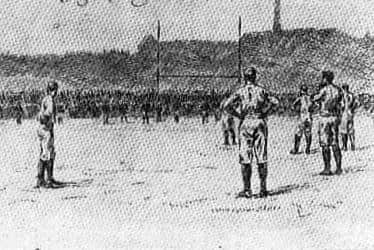Auld Enemies: The letter to the Scotsman that cemented rugby's oldest rivalry
It is the letter that threw down the gauntlet to what would become the oldest fixture in international rugby – Scotland v England.
In the pages of this newspaper a little over 150 years ago a group of intrepid patriots made a public challenge to their fellow players of the new game of rugby south of the border, inviting them to venture north to try their luck.
Advertisement
Hide AdAdvertisement
Hide AdA few months later on March 27, 1871, Scotland would, to the joy of their thousands of fans, narrowly pip England at their first home, Raeburn Place.
Now, as players limber up for the 150th annual test between the Auld Enemies tomorrow at Twickenham a digital copy of the letter taken from the Scotsman archives is taking pride of place in the Scottish Rugby Union’s online commemoration of the sport’s oldest international rivalry.
The sporting challenge was firmly laid down a few months earlier on December 8, 1870, when officials from five of Scotland’s most prominent rugby clubs issued a letter to The Scotsman inviting any team "selected from the whole of England" to participate in a game played under rugby rules.
It would be 20 players per team, and Blackheath Rugby Club in London - that had been formed in 1858 - accepted it with the aim of compiling a representative England team. Less than four months later, the first international rugby union match took place.


With the construction of Murrayfied Stadium still decades away, Raeburn Place, which sits in the Edinburgh suburb of Stockbridge and is named after the Scottish painter Sir Henry Raeburn, hosted the game.
It was a ground that had been acquired by members of Edinburgh Academicals in 1853 and four years later a match was staged between the Academicals and University of Edinburgh.
It went on to become the Scotland national rugby team's home venue for 25 years and more recently hosted the Women's Rugby World Cup final (1994) and staged Scotland fixtures in the Cricket World Cup (1999).
The Scottish sidethat took to the field in 19871 came from seven teams - Edinburgh Academicals, Glasgow Academicals, St Andrew's University, Merchistonians, Edinburgh University, West of Scotland and Royal HSFP - and was captained by Edinburgh Academicals player Francis Moncrieff.
Advertisement
Hide AdAdvertisement
Hide AdEngland were led by Blackheath's Frederick Stokes, with the visitors represented by a variety of clubs, including Clapham Rovers, Marlborough Nomads, Ravenscourt Park and Richmond. One of two umpires selected to officiate was Hely Hutchinson Almond, a Scottish physician, politician and headmaster.
The game was watched by more than 4,000 spectators, who witnessed two 50-minute halves of rugby.
Angus Buchanan and William Cross scored tries for Scotland, with Clapham Rovers' Reg Birkett claiming England's touchdown. Crucially, though, only kicks dictated the scoring, and what was effectively a 1-0 victory was secured by Cross converting Buchanan's try.
England had headed north in confident mood, but they could have no complaints about the result. It launched the series of games between Scotland and England that currently stands at 138 played, with England leading the series 76-43 and 19 matches drawn.
Graham Law, Senior Corporate Affairs and Stakeholder Manager for Scottish Rugby, says modern rugby fans owe eternal thanks to the five Scots clubs that issued the challenge to England.
He said: "These guys were obviously trailblazers. The game didn’t look anything like it does today. For a start, it was 20-a-side and the physical element was very much focused on strength and born out of the traditional ba’ games played in the Borders and the like.
"We owe a huge debt of gratitude to those pioneers. Without their determination, their wit and intelligence, who knows how the game would have evolved – or if it would have evolved at all.”
A message from the Editor:
Thank you for reading this article. We're more reliant on your support than ever as the shift in consumer habits brought about by coronavirus impacts our advertisers.
If you haven't already, please consider supporting our trusted, fact-checked journalism by taking out a digital subscription at https://www.scotsman.com/subscriptions.
Comments
Want to join the conversation? Please or to comment on this article.